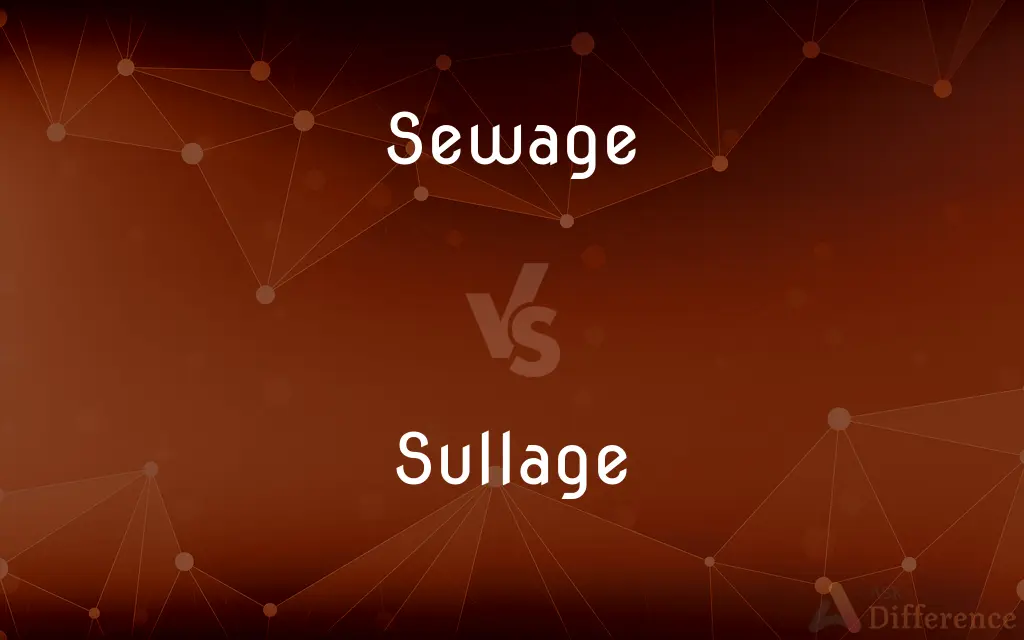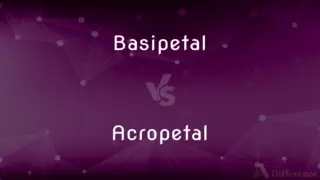Sewage vs. Sullage — What's the Difference?
By Fiza Rafique & Urooj Arif — Updated on March 4, 2024
Sewage is wastewater containing pollutants from toilets and industrial processes, while sullage refers to wastewater from domestic activities excluding feces and urine.

Difference Between Sewage and Sullage
Table of Contents
ADVERTISEMENT
Key Differences
Sewage is a type of wastewater that is generated from residential, industrial, commercial, or agricultural activities. It contains a wide variety of pollutants including human waste, food scraps, oils, soaps, and chemicals. On the other hand, sullage, also known as greywater, emanates primarily from domestic processes such as dishwashing, laundry, and bathing, excluding any human waste.
Sewage systems are designed to transport this wastewater to treatment facilities where it can be processed and either released into the environment safely or reused. Whereas sullage, being less contaminated, can be reused with minimal treatment for gardening and irrigation, highlighting differences in management and treatment approaches.
The treatment of sewage often requires complex and multi-stage processes due to the presence of harmful pathogens and chemicals. These processes can include primary, secondary, and tertiary treatments to remove solids, organic matter, and nutrients. Sullage, however, may only need basic filtration and disinfection before it can be considered safe for certain types of reuse, reflecting its lower level of contamination.
Regulations regarding the disposal and treatment of sewage are typically stricter compared to those for sullage. This is because sewage poses a greater risk to public health and the environment due to its composition. Sullage regulations are often less stringent, recognizing its potential for reuse and lower health risks.
Understanding the distinction between sewage and sullage is crucial for effective water management and conservation strategies. By treating and reusing sullage for non-potable purposes, communities can reduce the demand on freshwater resources, while sewage treatment prevents the spread of diseases and environmental degradation.
ADVERTISEMENT
Comparison Chart
Source
Toilets, industrial processes
Domestic activities (e.g., dishwashing, laundry)
Composition
Human waste, chemicals, food scraps
Soap, detergents, dirt, food particles (excluding feces, urine)
Treatment Required
Multi-stage (primary, secondary, tertiary)
Minimal (filtration, disinfection)
Reuse Potential
Limited to non-potable purposes post-treatment
Higher for irrigation and gardening without extensive treatment
Regulatory Standards
Stricter due to public health risks
Less stringent, varies by region
Compare with Definitions
Sewage
Can be a source of environmental pollution if not properly managed.
Untreated sewage discharge can lead to water pollution and health hazards.
Sullage
Greywater from domestic activities excluding toilet waste.
We recycle sullage from our home for garden irrigation.
Sewage
Wastewater from various sources including residential and industrial activities.
The sewage from our city is treated at the central wastewater plant.
Sullage
Generally contains soap, detergent, and food particles.
The sullage tank filters out solids before the water is reused.
Sewage
Contains a wide range of contaminants including pathogens and chemicals.
Sewage treatment removes harmful substances before release into rivers.
Sullage
Easier to treat compared to sewage due to less contamination.
A simple filtration system is sufficient for treating sullage for reuse.
Sewage
Requires complex treatment processes to make it safe.
The sewage undergoes several purification stages at the treatment facility.
Sullage
Subject to different regulations than sewage.
Local guidelines permit the direct reuse of sullage for landscaping.
Sewage
Managed through sewage systems leading to treatment plants.
The new housing development will be connected to the municipal sewage system.
Sullage
Can be reused for non-potable purposes with minimal treatment.
Sullage is used for flushing toilets in eco-friendly buildings.
Sewage
Sewage (or domestic sewage, domestic wastewater, municipal wastewater) is a type of wastewater that is produced by a community of people. It is characterized by volume or rate of flow, physical condition, chemical and toxic constituents, and its bacteriologic status (which organisms it contains and in what quantities).
Sullage
The liquid discharges from kitchens, washbasins, toilets etc; sewage.
Sewage
Liquid and solid waste carried off in sewers or drains.
Sullage
Drainage of filth; filth collected from the street or highway; sewage.
The streets were exceedingly large, well paved, having many vaults and conveyances under them for sullage.
Sewage
A suspension of water and solid waste, transported by sewers to be disposed of or processed.
Sewage
The contents of a sewer or drain; refuse liquids or matter carried off by sewers
Sewage
Waste matter carried away in sewers or drains
Common Curiosities
What is sewage?
Sewage is wastewater that includes a mix of contaminants from residential, commercial, industrial, and agricultural sources, including human waste.
Is sullage harmful to the environment?
If not properly managed, sullage can still pose environmental risks, though less so than untreated sewage.
What is sullage?
Sullage, or greywater, is non-industrial wastewater generated from domestic activities like laundry, dishwashing, and bathing, excluding toilet waste.
What are the main sources of sewage?
Main sources include households, commercial buildings, industrial operations, and agricultural practices.
How can sewage affect public health?
Untreated sewage can lead to waterborne diseases and environmental degradation, posing serious public health risks.
Can sewage be used for irrigation?
Treated sewage can be used for irrigation and other non-potable purposes, following safety standards to minimize health risks.
What happens to untreated sewage?
Untreated sewage can contaminate water bodies, leading to pollution and health hazards for humans and wildlife.
Can sullage be reused without treatment?
While sullage can be reused, it often requires basic treatment to remove particles and disinfect before it is safe for purposes like irrigation.
Why is sullage considered easier to treat than sewage?
Sullage contains fewer pathogens and harmful chemicals, making its treatment simpler and less costly.
How do sewage treatment plants protect the environment?
They remove contaminants from sewage before it is released back into the environment, thus protecting water resources and ecosystems.
How are sewage and sullage treated?
Sewage requires complex, multi-stage treatment processes, while sullage can often be reused with minimal treatment such as filtration and disinfection.
What is the difference in regulations for sewage and sullage?
Sewage disposal and treatment are generally subject to stricter regulations due to its potential health risks, whereas sullage regulations may be less stringent.
What are the benefits of reusing sullage?
Reusing sullage helps conserve water, reduces the demand on freshwater resources, and can contribute to sustainable water management practices.
Are there technologies to recycle sullage at home?
Yes, there are systems designed to filter and disinfect sullage for reuse in irrigation and flushing toilets.
What role does sewage play in water pollution?
Sewage is a major contributor to water pollution when not treated properly, affecting aquatic life and water quality.
Share Your Discovery

Previous Comparison
Embellishment vs. Decoration
Next Comparison
Basipetal vs. AcropetalAuthor Spotlight
Written by
Fiza RafiqueFiza Rafique is a skilled content writer at AskDifference.com, where she meticulously refines and enhances written pieces. Drawing from her vast editorial expertise, Fiza ensures clarity, accuracy, and precision in every article. Passionate about language, she continually seeks to elevate the quality of content for readers worldwide.
Co-written by
Urooj ArifUrooj is a skilled content writer at Ask Difference, known for her exceptional ability to simplify complex topics into engaging and informative content. With a passion for research and a flair for clear, concise writing, she consistently delivers articles that resonate with our diverse audience.














































